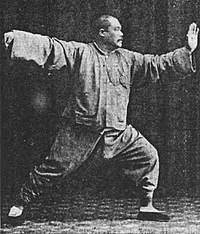 Yang Chengfu in a posture from the Yang style tai chi chuan solo form known as Single Whip c. 1931 |
|
| Also known as | t’ai chi ch’üan; taijiquan |
|---|---|
| Focus | Hybrid |
| Hardness | Forms competition, light-contact (pushing hands, no strikes), full contact (striking, kicking, throws, etc.) |
| Country of origin | China |
| Creator | Disputed |
| Parenthood | Tao Yin |
| Famous practitioners | Chen Changxing, Yang Luchan, Chen Fake, Yang Chengfu, Wu Jianquan, Sun Lutang |
| Olympic sport | Demonstration only |
Tai Chi Health Benefits: the Modern Incarnation of Tai Chi
Social awareness of Tai Chi health benefits has become very popular in the last twenty years or so. As baby boomers age, the art’s reputation for ameliorating the effects of aging becomes more well-known. As a result of this popularity, there has been some divergence between those who say they practice tai chi primarily for self-defense, those who practice it for its aesthetic appeal ( wushu ), and those who are more interested in its benefits to physical and mental health.
The wushu aspect is primarily for show. The forms taught for those purposes are designed to earn points in competition and are mostly unconcerned with either health maintenance or martial ability. More traditional stylists believe the two aspects of health and martial arts are equally necessary: the yin and yang of tai chi chuan. The tai chi “family” schools therefore still present their teachings in a martial art context whatever the intention of their students in studying the art.
Research into Tai Chi Health Benefits
Before tai chi’s introduction to Western students, the tai chi health benefits were largely explained through the lens of Traditional Chinese Medicine. TCM is based on a view of the body and healing mechanisms not always studied or supported by modern science. Today, some prominent tai chi teachers have advocated subjecting tai chi health benefits to rigorous scientific studies to gain acceptance in the West.
 Researchers have found that long-term tai chi practice shows some significant effects on the promotion of balance control ( see our study at Journal of Geriatric Physical Therapy), flexibility and cardiovascular fitness and reduced the risk of falls in elderly patients. The studies also show some reduced pain, stress and anxiety. Other studies have indicated improved cardiovascular and respiratory function in healthy subjects as well as those who had undergone coronary artery bypass surgery. Patients that suffer from heart failure, high blood pressure, heart attacks, arthritis, multiple sclerosis can experience the health benefits of Tai Chi. Parkinson’s, and Alzheimer’s patients are being studied to determine the extent of tai ch health benefitsi. Tai Chi has reduced levels of LDLs 20-26 milligrams when practiced for 12-14 weeks. There have also been indications that tai chi might have some effect on noradrenaline and cortisol production. This can effect mood and heart rate.
Researchers have found that long-term tai chi practice shows some significant effects on the promotion of balance control ( see our study at Journal of Geriatric Physical Therapy), flexibility and cardiovascular fitness and reduced the risk of falls in elderly patients. The studies also show some reduced pain, stress and anxiety. Other studies have indicated improved cardiovascular and respiratory function in healthy subjects as well as those who had undergone coronary artery bypass surgery. Patients that suffer from heart failure, high blood pressure, heart attacks, arthritis, multiple sclerosis can experience the health benefits of Tai Chi. Parkinson’s, and Alzheimer’s patients are being studied to determine the extent of tai ch health benefitsi. Tai Chi has reduced levels of LDLs 20-26 milligrams when practiced for 12-14 weeks. There have also been indications that tai chi might have some effect on noradrenaline and cortisol production. This can effect mood and heart rate.